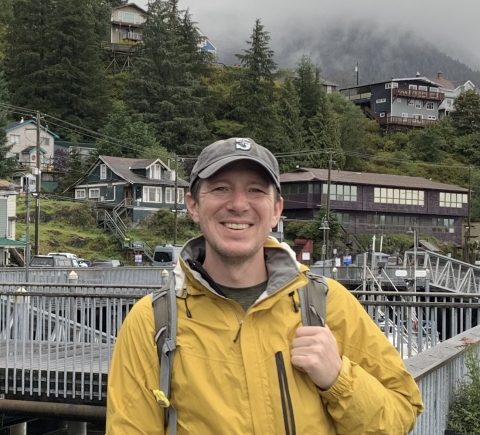Eric Walkingshaw, an ARCS alum who earned his PhD at Oregon State University, is cautiously excited about AI (Artificial Intelligence) and very excited about his current role at Elemental Cognition. The company offers a way to make AI more accurate.
“The thing people are most excited about right now are Large Language Models (LLMs), such as Chat GPT” he says. “LLMs are essentially language extenders. You can ask it to synthesize text, and it can do that. What’s amazing about these models is how sort of powerful and general purpose they are,” Walkingshaw explains. “They’ve built the models that can do this with massive amounts of data, like significant percentages of the internet amounts of data. And the result is they are kind of amazing,” he says.
Walkingshaw encourages everyone to engage with an LLM, “it feels like you are talking to something intelligent.”
But, Walkingshaw says, LLMs are flawed. “The problem is, when you dig into the details, the details are often wrong. Under the hood, they are sort of smooth-talking liars.” LLMs are “prone to going off the rails” during long interactions and say bizarre things.
Enter Elemental Cognition, where Walkingshaw works as a compiler engineer on the product Cogent. Cogent aims to have domain experts, who are not programmers, write down all the domain knowledge they have in a way that Cogent can understand and use. The input to the program is specific.
“A domain expert will be able to start writing down, in a language that looks and reads like plain English, all the relevant concepts, facts and rules that are needed to reason in their domain of expertise. The language is a special subset of English that Cogent can understand,” he explains.
While excited about the use of LLMs and AI, but wary “about the high degree of harm” it can create if not used carefully, Walkingshaw sees Elemental Cognition as providing an alternate path. “It’s a path that requires a bit more investment up front to use, but significantly minimizes the potential for harm of these systems, and so is a much better foundation to build on,” he says. “They are starting from correctness first, and sort of extending the capabilities of the AI with LLMs.” The other way is starting with the generality of Large Language Models and trying to constrain it to be correct.
“If you started with something correct and grow it from there, you’re more likely to have something correct at the end,” he says.
Walkingshaw was a scholar at Oregon State University in 2013, earning his PhD in electrical engineering. He did a post-doc in Germany, then returned to Oregon State University as a professor for several years, before returning to industry. He is content to have a position that uses his specific skills, while working on the growing wave of AI. He is also happy to work remotely and still live in Corvallis.
He considered the ARCS scholar award to be “life changing.” He and his wife were in school at the same time and “times were very lean.” Walkingshaw used his award to travel to conferences, but often his wife would join him, and they were able to add in some vacation. He also fondly remembers his award sponsors, two Oregon members. “They were cheering for me and just so enthusiastic about it,” he said.

